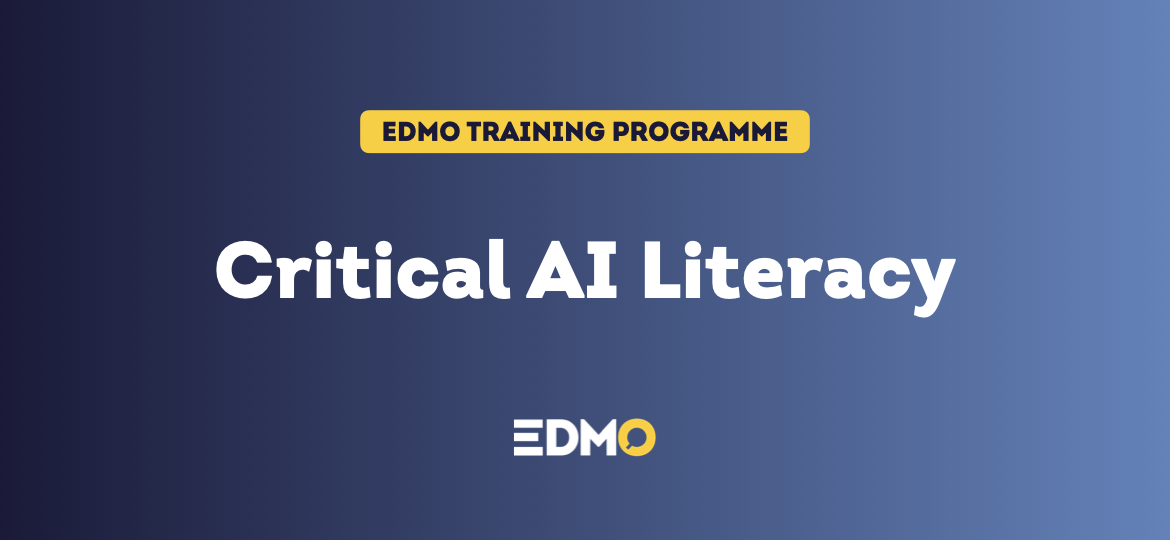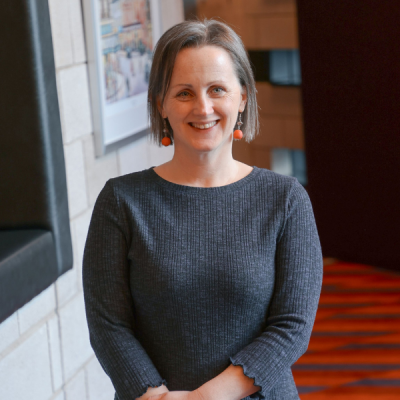On 14 March 2025, the EDMO Online Training on Critical AI Literacy explored the concept of critical artificial intelligence literacy and its integration into media literacy initiatives tailored for diverse audiences. AI literacy broadly refers to the ability to understand, use, and critically assess AI technologies, along with their applications and implications.
Missed this training? Watch the recording at the bottom of this page.
Three experienced trainers delved into questions such as:
- What do people (children, adults) need to know and understand about how algorithms and artificial intelligence work? What skills do they need?
- Given the complexity and inaccessibility of these technologies, how much can we expect the public to understand?
- How can those teaching AI literacy keep up with seemingly constant developments in the AI landscape and a stream of new products and tools?
Jo Reynolds, Research & Evaluation Manager at the Good Things Foundation, analysed AI literacy from the perspective of digital inclusion. The trainer emphasised how the affordability of communication services and foundational digital skills remains a significant challenge in the UK for digital inclusion. Additionally, safety concerns represent a high barrier to people’s motivation to build their digital skills.
The Foundation therefore aims to reverse such trends through an approach based on access – by providing people with free mobile data SIMS, vouchers and devices -, skills and confidence building via free basic digital skills training, and a network of local support.
Having acknowledged the potential value of AI in helping people who might be digitally excluded, the organisation commissioned research to look into the need and to understand what people with low digital skills know about AI, what they are interested in and what is the best way to support them. Their research found that individuals with low digital skills have limited awareness of AI and feel overwhelmed by it, often influenced by negative media narratives. Overall, engagement with AI proved to be more likely with foundational digital skills already in place.
As a consequence, Good Things Foundations produced recommendations on how people who are learning their digital skills can best be supported to engage with AI. AI literacy support needs to focus on practical tasks and needs to be tailored to an individual’s needs and interests.
Moreover, both risks and positive sides of AI need to be balanced and communicated. A second part of the research focused on building an AI-confident community, by supporting community organisations delivering digital skills training and helping them explore the use of AI themselves in their organizational practices. The main takeaway of the presentation was that in order to build digital literacy, media literacy and AI literacy, digital inclusion is a strong prerequisite.
Representing the Finnish NGO Faktabaari, Kari Kivinen presented the organisation’s work concerning the promotion of education for teachers and students on how to tackle disinformation. Through their AI Guide on Digital Literacy, Faktabaari, which is part of the NORDIS EDMO Hub, aims to help teachers understand generative AI, ethical challenges, impacts on education, EU legislation, and threats like deepfakes.
In the guide, a clear definition of AI is provided, by attempting to answer the following questions: What is generative AI and how does it work? How can AI be used in a responsible and ethical way to support teaching and promote learning? How is AI changing? What is its social impact on the labour market, environment, communication, and future professions? Why is there a need for a healthy critical approach to AI outputs?
Faktabaari conducted a poll in November 2024 among teachers in Finland who had applied for an AI course and 25% of them reported not having sufficient skills to use AI tools. Nobody among the surveyed teachers reported having good basic skills. Teachers are currently in the difficult position of being responsible for teaching students how to use AI technologies safely when schools do not have clear guidelines and have a partly outdated curriculum.
Empowering students with critical thinking, problem-solving skills, and creativity is essential due to the differences between generative AI tools and search engines, and due to the ethical challenges and risks of AI in education. This is an opportunity for NGOs to try, to provide guidance and information for teachers, while waiting for official instructions.
As a fact-checking organization, Faktabaari is gravely concerned about the rise of disinformation through deepfakes. For this reason, an educational game was created to spot AI-produced content.
The coordinator of the EDMO Ireland Hub, Eileen Culloty, presented her experiences and approach to integrating AI literacy into media literacy work, through “AI literacy in the classroom” workshops, mainly aimed at secondary school teachers, librarians and undergraduate students.
The purpose of the workshop is mainly to demystify AI, starting with general reflection questions to participants, to understand their assumptions and concerns regarding AI. Due to the fast-moving nature of AI, checking in with the target audience encourages interactivity and, at the same time, helps the trainer adjust the session to meet the needs of the audience or to tailor future sessions accordingly.
Additionally, foundational knowledge of what AI is and how it works is provided through the workshop. Practical how-to skills on AI use are explored in the final part of the workshop, with the support of examples. The trainer stressed the need to build core foundational knowledge of AI before diverting toward how-to skills. For this reason, her sessions also include an outline of the story of AI, with clear and understandable definitions and explanations.
Overall, the main takeaways collected by the trainer after delivering “AI literacy in classrooms” workshops for one year are that AI is a fast-moving area, which offers both risks and opportunities that need to be balanced when AI is presented to an audience, and which is also political and shaped by the ambitions of companies.
Meet your Trainers
I am a research and evaluation expert, with experience across a range of areas of social and health inequalities, and PhD in public health. I am the Research & Evaluation Manager for Good Things Foundation, a charity working to fix the digital divide in the UK. My role involves measuring the difference our work makes to people’s digital access, skills and confidence, and undertaking research to explore the barriers and facilitators to increasing digital inclusion.
Dr Kari Kivinen has led the Finnish NGO Faktabaari EDU project since 20217 and has edited, among others, the Digital Information Literacy Guide (2022), the Guide to Artificial Intelligence (2024) and the AI Guide for Teachers (January 2025). He is a member of several expert groups, such as the DG EAC Digital Education Content (DEC) Expert Group and the Tackling Disinformation and Promoting Digital Literacy Expert Group.
Deputy director of the DCU Institute for Media, Democracy, and Society; coordinator of EDMO Ireland; and co-chair of Media Literacy Ireland.
Target audience
The training session is open to media and digital literacy practitioners and experts interested in including AI literacy in their work.
Deadline for applications
10 March 2025, 13:00 CET.
Applications are now closed



